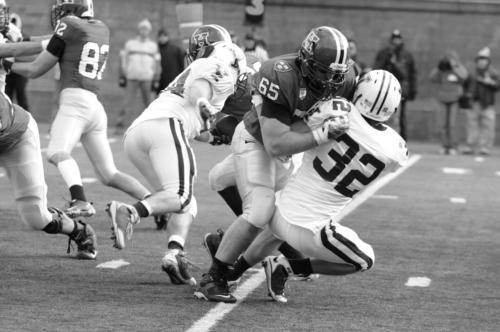Athletics have never—ever—been my strong suit, but when I talk to my mother about Harvard, I wind up running defense. She’s coming at me with endowments and advising and “Why should you have to pay to see your peers perform?” and “Why can’t the house just open storage early for you?,” and I’m right back at her with economic realities and intellectual independence and “Student groups support themselves” and “That’s just the way it is.” It’s helmet to helmet almost every time, but her maternal indignation is no match for my impulsive rebellion. I’m on the defensive before she’s even chosen a play. The funny thing is, most of the time I agree with her.
It’s like an out of body experience. Words are coming out of my mouth on one plane and I’m listening to them on another, thinking “Really? I’m the great defender, here?” More often than not, I’ve been frustrated with Harvard and, to be honest, there have been occasions when I’ve questioned my decision to come here. Harvard’s administrative structure is notoriously non-intuitive, and the doors to University Hall and the Holyoke Center seem to be revolving constantly as deans come and go. I’ve felt backed into corners by bureaucratic academic departments, apathetic professors, fierce competition for limited opportunities—and occasionally all three at the same time.
But despite all of this, when I graduate in December—more on that in a bit—there is no question that I will be a better person than I was four years ago, and that Harvard has made me so.
Yes, I took time off. The fall of my junior year—and it was the best decision I’ve ever made. We start here at 18, and not only are we facing down an institution more august and more challenging than anything we’ve ever imagined, we have to figure out where we fit in. As a freshman, I threw myself into the theater community with the force that only a freshman can muster. I was earnest, eager to please, and I wanted to make theater my life. I was in the Loeb every night from 6 p.m. to midnight—in the rehearsal rooms, in the Ex, in the Mainstage, in the shop—for however long I was needed, and after that, as long as I was tolerated. I was exhausted and overworked, and I thought that I loved it.
Turns out, Harvard is a crucible: We throw 1,600 of the world’s brightest, most dedicated, least sleep-dependent young adults together, then crank up the competitive heat, and the impurities burn off. You have to figure out the few things worth holding on to, while all the rest—the interests you thought were callings, the hobbies you thought were passions—fizzles away. It’s the Harvard way of saying you can’t do it all: Almost no matter what, someone is already doing it better than you.
Harvard theater gets very little non-financial support from the University, which is great in the sense that Harvard students get to take on jobs like directing and producing that at other universities would be afterthoughts for professionals. It would be easier, yes, but less enriching if Harvard worked that way. If you love it, if you’re focused and energetic and talented and tireless, then there is no better feeling than the one you get just before the lights come up on opening night. But I wasn’t any of those things, which I realized in the spring of my sophomore year. It was terrifying, actually. When I was no longer funneling all of my energy into theater, I felt like it was leaking out everywhere, getting lost in the great beyond.
Lucky for me—and for everyone, I suppose—personal energy is like water on pavement: It finds all the cracks and crevices. That fall I got an internship in New York at a radio show called Studio 360, and started writing for The Crimson in earnest the following spring. My theater experience, meanwhile, made itself useful on the sidelines by getting me on the tech crew of the Hasty Pudding Theatricals. If Harvard had made things easy for me, I might never have figured out that theater was one of the hobbies and not one of the passions. Like a massive lineman, Harvard doesn’t stop to make sure you’re okay when it knocks you down. It keeps running, and it’s up to you to figure out how to get up and get back in the game.
So thank you, Harvard, for tackling me. It might have been nicer of you if you hadn’t, and I’m sure that my mother would have preferred it, but I’m glad that you did, because that’s how the game ought to work. That’s also how the world works, right? So now I’m ready for it. Okay, Mom?
Jillian J. Goodman ’09, a Crimson arts writer, is an English concentrator in Quincy House.
Read more in Opinion
Five Reasons for Reason and Faith













